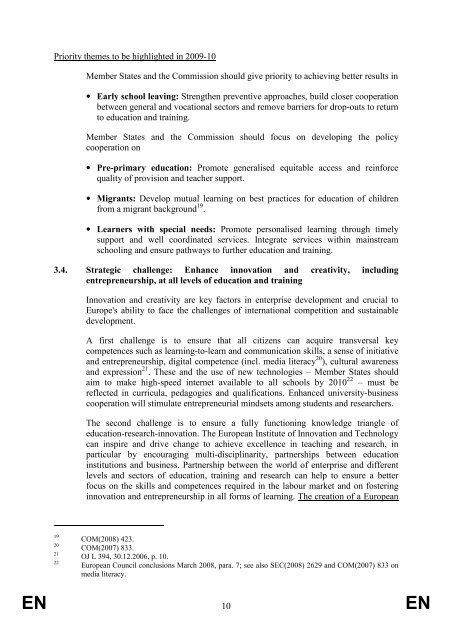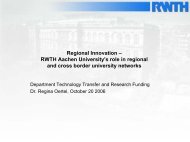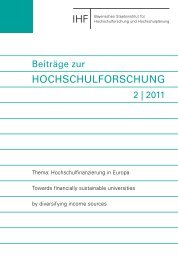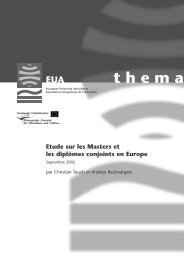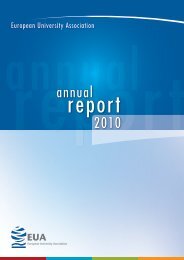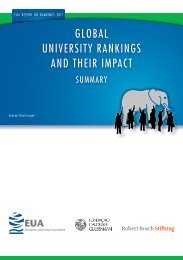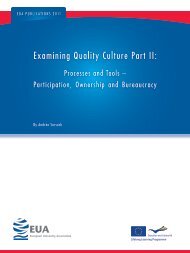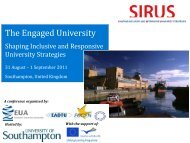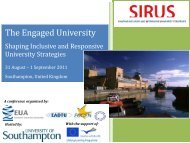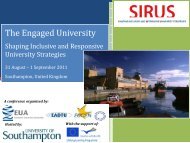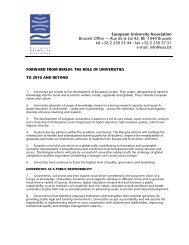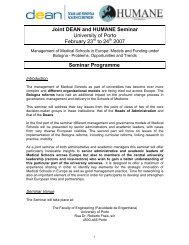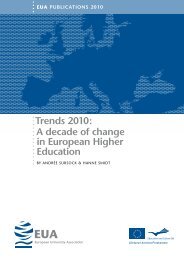17535/08 - European University Association
17535/08 - European University Association
17535/08 - European University Association
You also want an ePaper? Increase the reach of your titles
YUMPU automatically turns print PDFs into web optimized ePapers that Google loves.
Priority themes to be highlighted in 2009-10<br />
Member States and the Commission should give priority to achieving better results in<br />
• Early school leaving: Strengthen preventive approaches, build closer cooperation<br />
between general and vocational sectors and remove barriers for drop-outs to return<br />
to education and training.<br />
Member States and the Commission should focus on developing the policy<br />
cooperation on<br />
• Pre-primary education: Promote generalised equitable access and reinforce<br />
quality of provision and teacher support.<br />
• Migrants: Develop mutual learning on best practices for education of children<br />
from a migrant background 19 .<br />
• Learners with special needs: Promote personalised learning through timely<br />
support and well coordinated services. Integrate services within mainstream<br />
schooling and ensure pathways to further education and training.<br />
3.4. Strategic challenge: Enhance innovation and creativity, including<br />
entrepreneurship, at all levels of education and training<br />
Innovation and creativity are key factors in enterprise development and crucial to<br />
Europe's ability to face the challenges of international competition and sustainable<br />
development.<br />
A first challenge is to ensure that all citizens can acquire transversal key<br />
competences such as learning-to-learn and communication skills, a sense of initiative<br />
and entrepreneurship, digital competence (incl. media literacy 20 ), cultural awareness<br />
and expression 21 . These and the use of new technologies – Member States should<br />
aim to make high-speed internet available to all schools by 2010 22 – must be<br />
reflected in curricula, pedagogies and qualifications. Enhanced university-business<br />
cooperation will stimulate entrepreneurial mindsets among students and researchers.<br />
The second challenge is to ensure a fully functioning knowledge triangle of<br />
education-research-innovation. The <strong>European</strong> Institute of Innovation and Technology<br />
can inspire and drive change to achieve excellence in teaching and research, in<br />
particular by encouraging multi-disciplinarity, partnerships between education<br />
institutions and business. Partnership between the world of enterprise and different<br />
levels and sectors of education, training and research can help to ensure a better<br />
focus on the skills and competences required in the labour market and on fostering<br />
innovation and entrepreneurship in all forms of learning. The creation of a <strong>European</strong><br />
19 COM(20<strong>08</strong>) 423.<br />
20 COM(2007) 833.<br />
21 OJ L 394, 30.12.2006, p. 10.<br />
22 <strong>European</strong> Council conclusions March 20<strong>08</strong>, para. 7; see also SEC(20<strong>08</strong>) 2629 and COM(2007) 833 on<br />
media literacy.<br />
EN 10 EN


